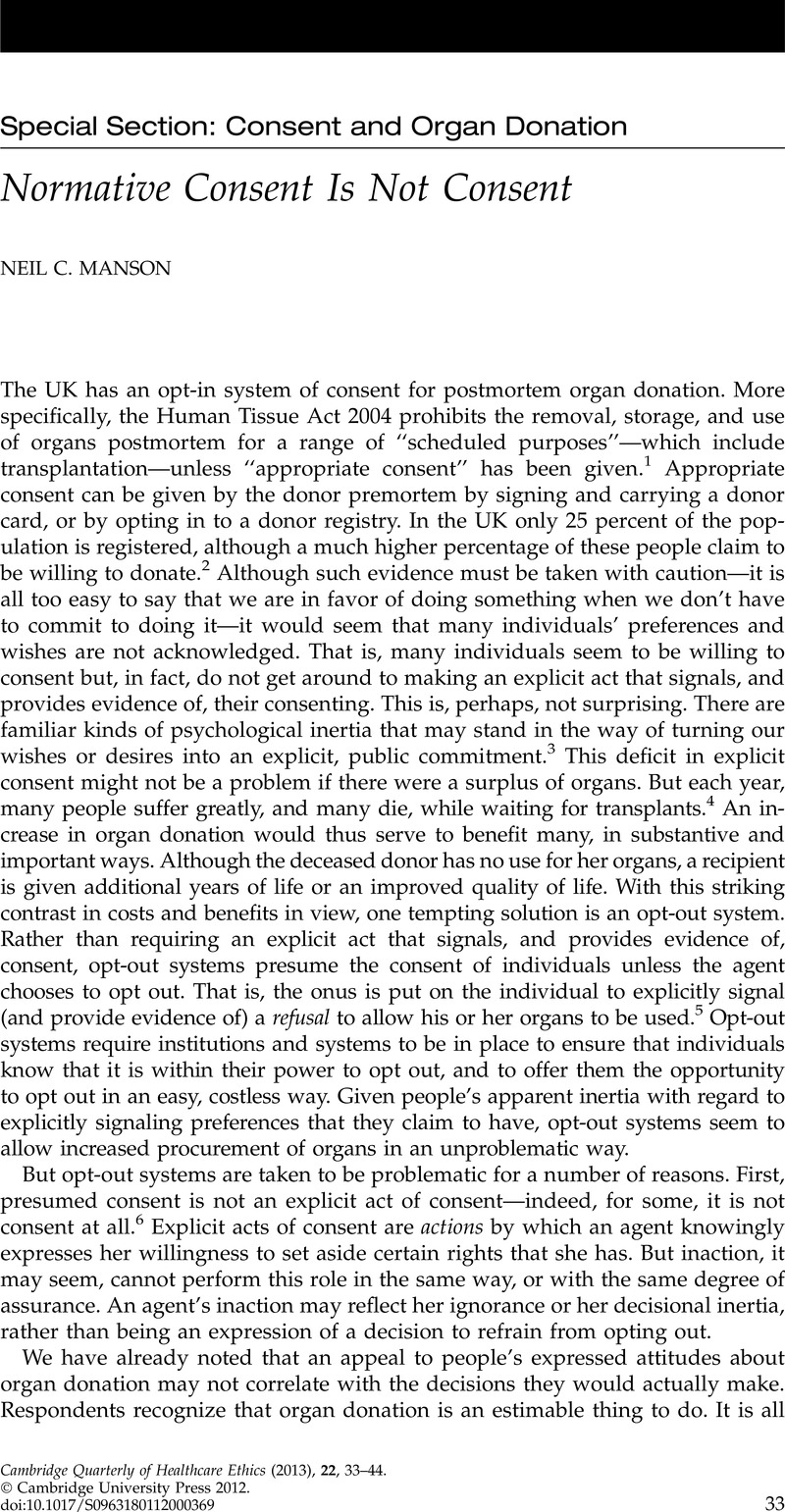Published online by Cambridge University Press: 04 December 2012

1. HTA 2004, Schedule 1, Part 1, (7).
2. E.g., a BBC survey in 2005 found that 90 percent of people were in favor of organ donation: http://www.bbc.co.uk/pressoffice/pressreleases/stories/2005/08_august/21/donation.shtml (last accessed 24 Aug 2012). The UK Organ Donation Taskforce offers a more cautious figure of “between 65% and 90%” (p. 18). UK Department of Health, Organ Donation Task Force. The potential impact of an opt out system for organ donation in the UK; UK Central Office of Information 2008, p. 18; available at http://www.dh.gov.uk/prod_consum_dh/groups/dh_digitalassets/@dh/@en/documents/digitalasset/dh_090303.pdf (last accessed 24 Aug 2012).
3. The BBC survey notes that 45% of respondents claimed they had not opted in because “they hadn’t really thought about it.” This, of course, may be disingenuous, along the lines of “I don’t give to charity because I didn’t know people were in need.”
4. In the UK, currently 1,000 people a year die while waiting for transplants. See note 2, UK Dept of Health 2008.
5. The shift from opt-in to opt-out systems may not be as important as other institutional, cultural, and economic factors. E.g., see Rithalia, A, McDaid, C, Suekarran, S.Impact of presumed consent for organ donation on donation rates: A systematic review. British Medical Journal 2009;338:a3162CrossRefGoogle ScholarPubMed; Abadie, A, Gay, S.The impact of presumed consent legislation of cadaveric organ donation: A cross-country study. Journal of Health Economics 2006;25:599–620.Google Scholar
6. E.g., for Erin, and Harris, , “presumed consent is a fiction. Without the actual consent of the individual, there is no consent.” Presumed consent or contracting out. Journal of Medical Ethics 1999;25:365–6CrossRefGoogle Scholar, at 365. Erin and Harris offer no argument for this assertion, however.
7. D’Ancona M. Hands off our bodies Mr Brown. The Spectator blog 2008 Jan 13; available at http://www.spectator.co.uk/coffeehouse/445696/hands-off-our-bodies-mr-brown.thtml (last accessed 24 Aug 2012).
8. Saunders, B.Normative consent and opt-out organ donation. Journal of Medical Ethics 2010;36:84–7, at 86.Google Scholar
9. Estlund, D.Democratic Authority: A Philosophical Framework. Princeton, NJ: Princeton University Press; 2007.Google Scholar
10. Note the shift to absence of consent, rather than refusal. This is an important contrast with Estlund’s theory, as we shall see subsequently. See note 8, Saunders 2010, at 86.
11. Potts, M, Verheijde, JL, Rady, MY, Evans, D. Normative consent and presumed consent for organ donation: A critique. Journal of Medical Ethics 2010;36:498–9.CrossRefGoogle Scholar
12. See note 11, Potts et al. 2010, at 499.
13. See note 8, Saunders 2010, at 86.
14. See note 11, Potts et al. 2010, at 499.
15. Since the writing of this article, a reply to these objections has been made by Saunders, which mirrors the responses offered here. Normative consent and organ donation: A vindication. Journal of Medical Ethics 2011;37:362–3.
16. The case arose with regard to the practice of dwarf tossing in Morsang-sur-Orge, in the suburbs of Paris, and ascended through local courts to the French Conseil d’État, leading to a pronouncement by the UN high commissioner on human rights in 2002. See Leget, C, Borry, P, De Vries, R.Nobody tosses a dwarf! The relation between the empirical and normative reconsidered. Bioethics 2009;23:226–35.Google Scholar
17. The distinction between permission and agreement is complex. An act of permission will typically involve undertaking a range of subsidiary obligations (an obligation to refrain from suing, for example). Such fine-tuned distinctions, although important in some contexts, are not of direct importance here.
18. See note 8, Saunders 2010, at 86.
19. See note 8, Saunders 2010, at 86.
20. See note 8, Saunders 2010, at 86.
21. See note 8, Saunders 2010, at 86.
22. See note 8, Saunders 2010, at 86.
23. See note 8, Saunders 2010, at 86.
24. See note 8, Saunders 2010, at 86.
25. See note 8, Saunders 2010, at 85.
26. See note 8, Saunders 2010, at 86.